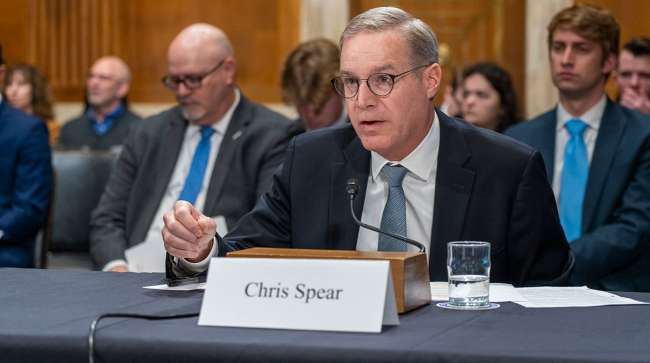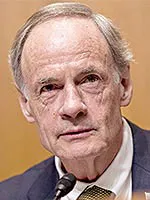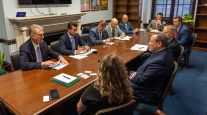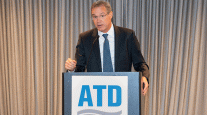Senior Reporter
ATA’s Chris Spear Presses Excise Tax Repeal at Senate Hearing

[Stay on top of transportation news: Get TTNews in your inbox.]
WASHINGTON — Federal policymakers seeking to modernize freight industry vehicles should revisit efforts to repeal a long-standing excise tax on new trucks, the leader of American Trucking Associations told a Senate committee Feb. 15.
Chris Spear, ATA’s president and CEO, pointed to potential supply chain connectivity and environmental benefits that would result from undoing a World War I-era 12% tax on new truck and trailer purchases.
Regulations and mandates from government agencies for emissions reduction as well as a drive toward decarbonization necessitate the deployment of cleaner or alternative-fuel vehicles. Such vehicles often are expensive and not widely available, Spear explained. The trucking federation along with myriad industry stakeholders have urged Congress to act on the tax for several years.
“If you want to get the newer, safer, more environmentally friendly equipment out on the road, you’ve got to incentivize it,” Spear told senators on the Environment and Public Works panel, referring to the excise tax. “We believe that repealing that would have a major impact on getting cleaner, more environmentally safe equipment out on the road, quicker.”
Thank you @SenatorCardin for leading on legislation to repeal the federal excise tax on heavy duty trucks. This antiquated tax from World War I adds 12% to the cost of a new power unit, which disincentives the deployment of cleaner and safer equipment on our nation's roads. https://t.co/DjLE4RnZ8c — American Trucking (@TRUCKINGdotORG) February 15, 2023
During the last session of Congress, senior policymakers on the House and Senate transportation committees introduced measures that would have repealed the 12% tax on new trucks and trailers, but the bills were not advanced to the president’s desk. Critics of the federal excise tax note it has been in place for more than a century and is considered among the highest on any product.
CARB approves the 2022 #ScopingPlan shifting California away from #fossilfuels & towards #renewableenergy. The final plan cuts #airpollution by 71%, reduces #GHGs 85% & reaches #carbonneutrality by 2045.
https://t.co/rZ7SoktUfr pic.twitter.com/JQELpphyif — CARB (@AirResources) December 16, 2022
During a wide-ranging hearing that focused largely on transportation emissions, Spear affirmed the industry’s need for realistic timelines and targets from Congress pertaining to emissions reductions. The ATA leader also pushed back on efforts in California that would set state-specific standards for the commercial transportation sector. The California Air Resources Board is seeking a zero-emission trucking landscape in the next decade.
If permitted to advance without input from the transportation sector, the proposed West Coast timelines for emission reductions will have far-reaching negative effects on the industry as well as the supply chain, Spear warned.
Excluding our industry in a mad dash to zero makes their timeline and targets not only unachievable … but guarantees they will fail.
American Trucking Associations President Chris Spear
“Excluding our industry in a mad dash to zero makes their timeline and targets not only unachievable … but guarantees they will fail,” he said.
He also urged a cautious approach as it relates to electric vehicles.
“To get to zero,” Spear added, “we must be honest and transparent about the road ahead. Sourcing rare minerals needed for millions of 5,000 pounds of truck batteries, the infrastructure needed to charge them and the additional electricity needed to power our trucks – full scale – doesn’t yet exist … and won’t if you allow California to set the nation’s standard.”
Relatedly, ATA touted EPA’s Diesel Emissions Reduction Act (DERA) program. According to EPA, the program is designed to reduce the number of older, diesel-powered trucks on the road and facilitate transition in the freight industry to newer equipment for operations along waterways, rails and commercial corridors.

Capito
Sen. Shelley Moore Capito (R-W.Va.), took aim at California’s push to require all new vehicles sold in the state be zero emissions by 2035.
“That target means higher costs for consumers to buy still-scarce electric vehicles and hydrogen vehicles, and the potential disruption of interstate commerce,” the committee ranking member told colleagues. She added, “According to Kelley Blue Book, the average price of an electric vehicle in the United States as of August of 2022 was $66,000. That is more than the median household income in my state, which is $50,000.”
Committee Chairman Tom Carper (D-Del.) called on industry leaders to embrace policies they would be able to support, and expressed a sense of urgency when it came to his party’s directives on reducing transportation emissions.

Carper
“Over the past two years, this committee has played a vital leadership role in passing historic infrastructure and climate legislation. Much of this success was bipartisan,” the chairman said. “Looking ahead, I’m eager to work with all of you as we aim to build on that record of success. Together, I know we can continue to develop lasting solutions to some of our biggest challenges.”
Spear was joined at the hearing by representatives from the Renewable Fuels Association and the American Air Liquide Holdings Inc.
Carper added, “As a senator from the lowest-lying state in our country, I can think of no greater challenge than the climate crisis. Last year, the National Oceanic and Atmospheric Administration reported that there were 18 climate disasters in the United States with losses exceeding $1 billion each. These costly disasters underscore the urgent need for further action to reduce greenhouse gas emissions and limit the impacts of climate change.”
Want more news? Listen to today's daily briefing below or go here for more info:




